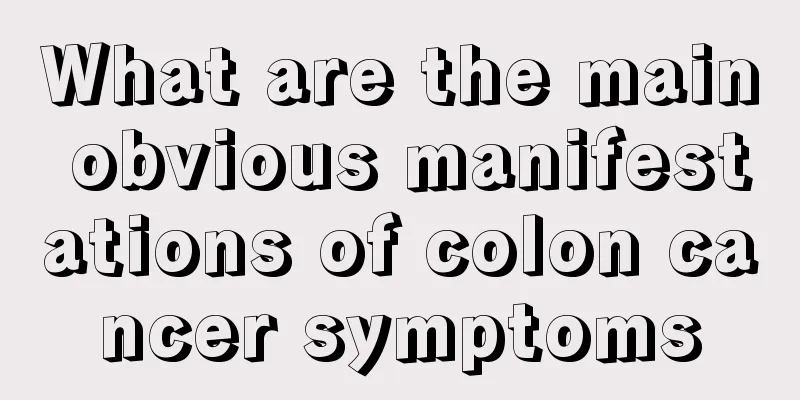What are the main obvious manifestations of colon cancer symptoms

|
If we want to detect the presence of colon cancer around us as early as possible, we must first have a certain understanding of the symptoms of colon cancer. What are the most common symptoms of colon cancer ? Let the experts introduce the symptoms of colon cancer in detail. (1) Abdominal pain and digestive tract irritation symptoms: Most patients with colon cancer have varying degrees of abdominal pain and discomfort, such as dull abdominal pain, right-sided abdominal fullness, nausea, vomiting, and loss of appetite. Symptoms often worsen after eating, sometimes accompanied by intermittent diarrhea or constipation, and are easily confused with chronic appendicitis, ileocecal tuberculosis, ileocecal segmental enteritis, or lymphomas that are common in the right lower abdomen. Hepatic flexure cancer of the colon can present as paroxysmal colic in the right upper abdomen, similar to chronic cholecystitis. It is generally believed that pain from right-sided colon cancer often reflects to the upper part of the navel; pain from left-sided colon cancer often reflects to the lower part of the navel. If the tumor penetrates the intestinal wall and causes local inflammatory adhesions, or forms a local abscess after chronic perforation, the pain site is where the tumor is located. (2) Abdominal masses: The symptoms of colon cancer are generally irregular in shape, hard in texture, and nodular on the surface. In the early stages of transverse colon and sigmoid colon cancer, there is a certain degree of mobility and mild tenderness. If ascending or descending colon cancer has penetrated the intestinal wall and adhered to the surrounding organs, chronically perforated to form an abscess, or pierced through adjacent organs to form an internal fistula, the mass is usually fixed, with unclear edges and obvious tenderness. (3) Changes in bowel habits and stool characteristics: The symptoms of colon cancer are the result of ulcers and secondary infections caused by tumor necrosis. Bowel habits change due to toxins stimulating the colon, with an increase or decrease in bowel movement frequency, and sometimes diarrhea and constipation alternating. There may be abdominal cramps before defecation, which are relieved after defecation. If the tumor is located lower or in the rectum, there may be symptoms of rectal irritation such as anal pain, difficulty in defecation, or tenesmus. The stool is often unformed and mixed with mucus, pus, and blood. Sometimes it contains a large amount of blood and is often misdiagnosed as dysentery, enteritis, hemorrhoidal bleeding, etc. The above information is about the symptoms of colon cancer. I hope it can help you. In fact, after we understand the symptoms of colon cancer, we must detect the existence of the disease in time and then treat it to control the spread of the disease. If you have any questions about the symptoms of colon cancer, you can consult our experts. Here I wish the patients a speedy recovery. |
<<: What is the best nursing method for ovarian cancer
>>: What are the best and most effective treatments for colon cancer
Recommend
How to tie hair to look good with a big face
Different face shapes should have different hairs...
Is the disinfection lamp harmful to the human body?
Disinfection lamps may cause certain harm to the ...
Does early stage breast cancer require chemotherapy?
Breast cancer has different clinical stages, whic...
Can mosquito coil ash cure athlete’s foot?
Nowadays, there are many folk remedies for treati...
Can tooth decay infect teeth?
Many people who have cavities are worried about o...
How to maintain health in spring?
Spring is the season when all things come back to...
Why is my tongue numb and astringent
It is common to bite your tongue while eating, bu...
Can I get pregnant if I have sex for three consecutive days on the day of ovulation?
Women who want to get pregnant quickly will caref...
The difference between early childhood education classes and kindergartens
When children reach the appropriate age, they wil...
How to quickly eliminate menstruation
During the menstrual period, many people still ha...
The best ointment for treating vulvitis
Vulvitis has a great impact on women's life a...
Is the chance of breast cancer high 3 months after giving birth?
The chance of breast cancer three months after ch...
What is the normal value of AFP?
The liver is an important organ in the human body...
Do I need to wear knee pads when running
Running is a very popular sport nowadays. During ...
How to effectively prevent the occurrence of bladder cancer?
Bladder cancer has hereditary characteristics, an...









